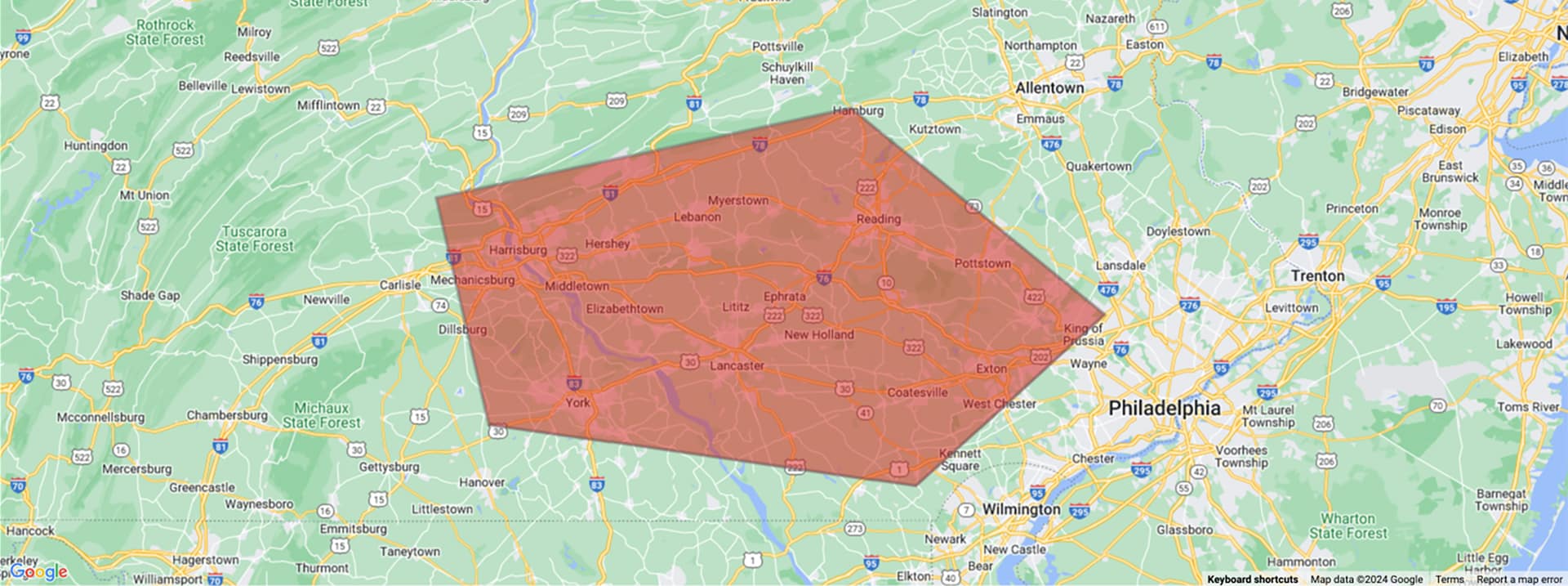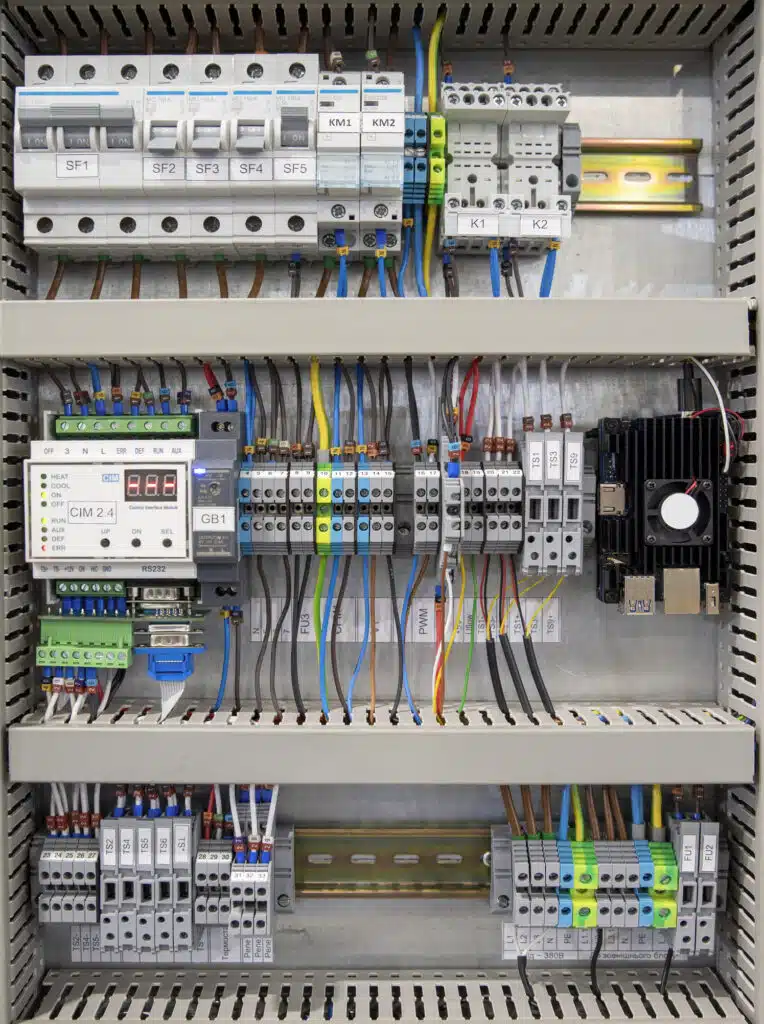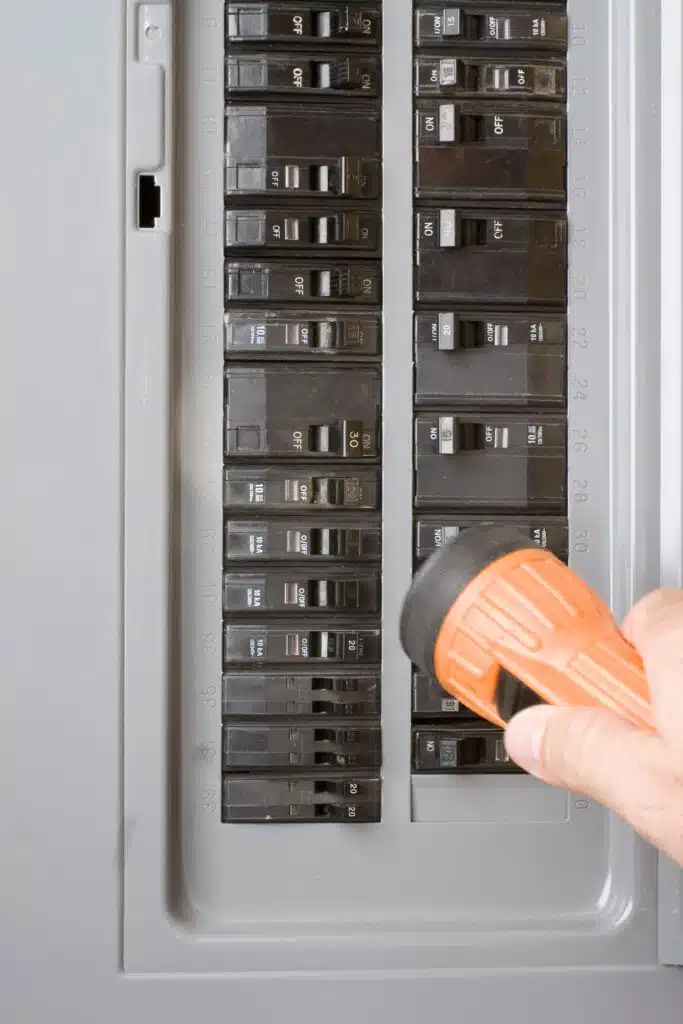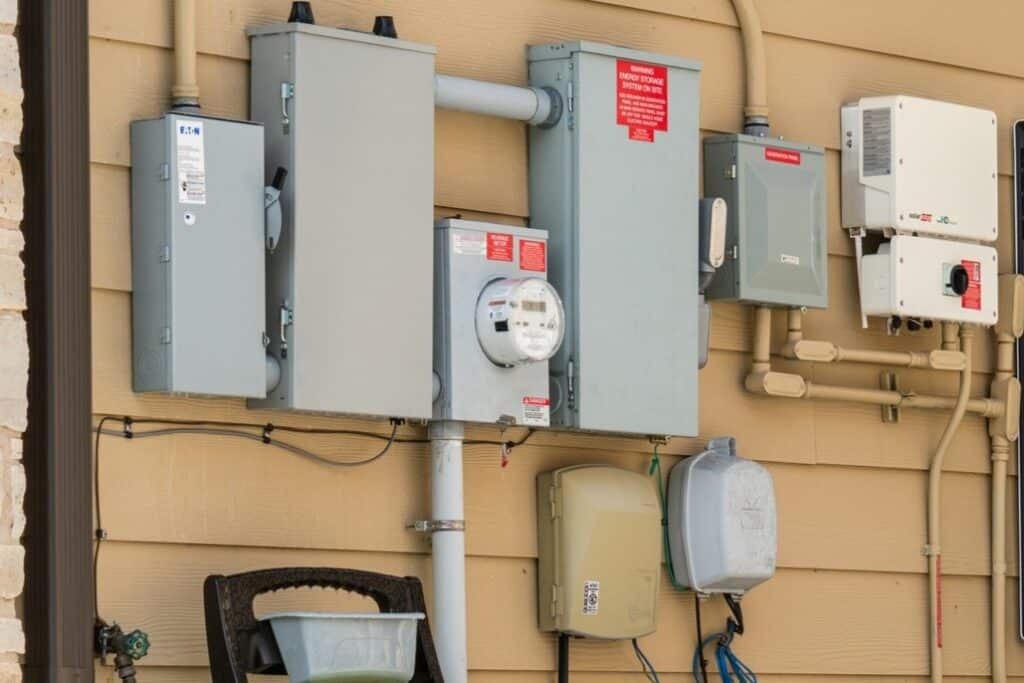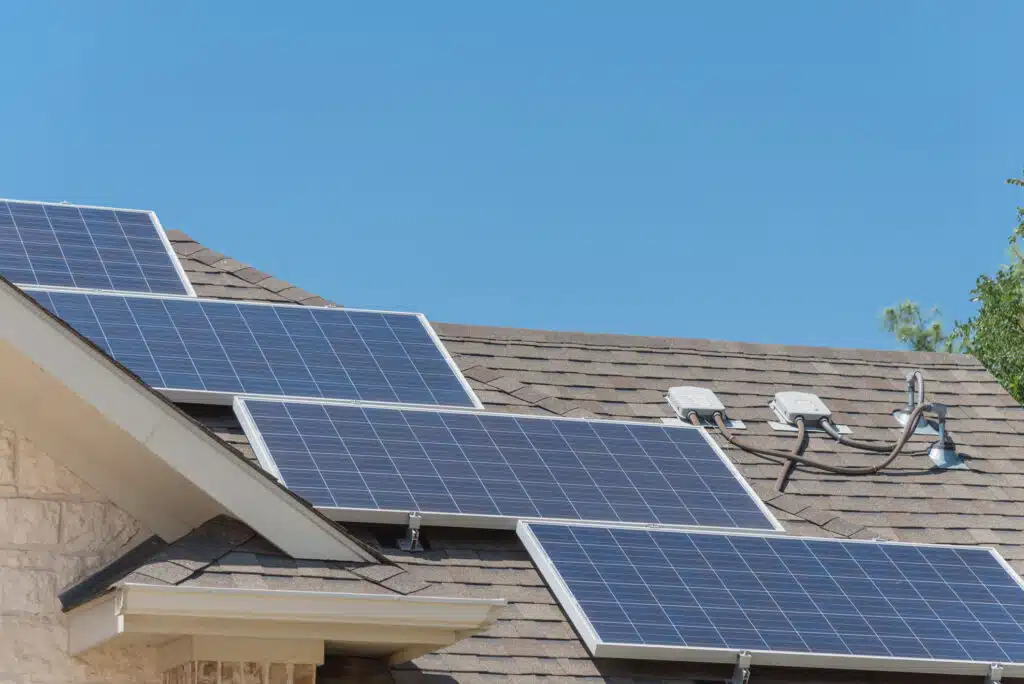Electrical Inspections – Did you know that small electrical issues can lead to major problems if left unchecked? Many people don’t think about the condition of their home’s wiring until something goes wrong. That’s why scheduling regular electrical inspections is so important.
These inspections can help identify potential problems before they become a serious safety hazard. And with cooler weather right around the corner, October is the perfect month to ensure your home’s electrical system is ready to handle the increased winter usage.
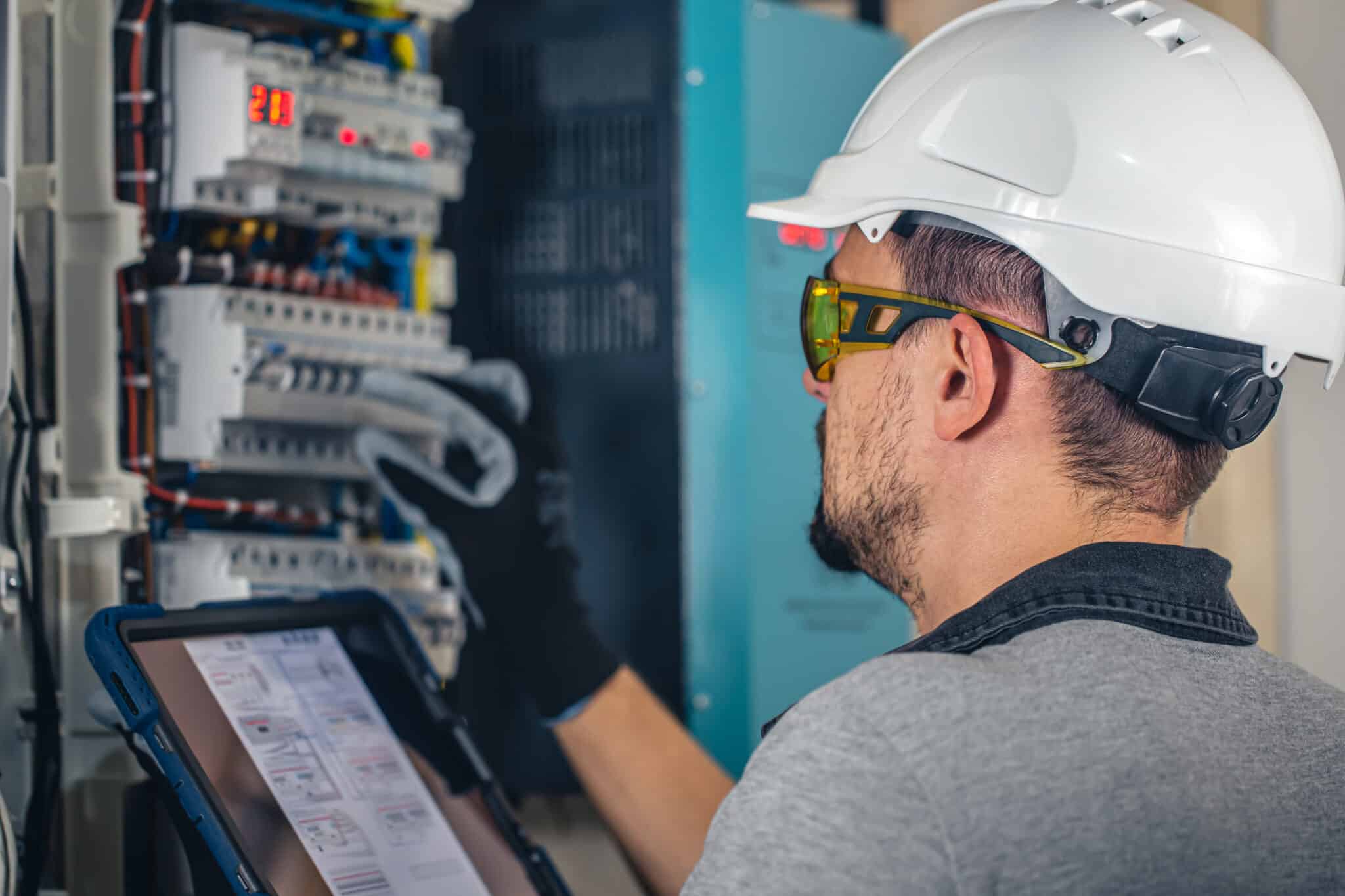
What Are Electrical Inspections?
So, what exactly are the electrical inspections? In simple terms, electrical inspections are a thorough check of your home’s wiring, circuits, outlets, and electrical panel to make sure everything is safe and up to code.
A professional electrician will look for signs of wear and tear, faulty wiring, overloaded circuits, and other issues that could pose a risk to your home and family.
During the electrical inspections, the electrician will also test your breakers, check for proper grounding, and inspect any outdated or damaged components.
This isn’t just about safety—electrical inspections can also improve your home’s energy efficiency by identifying spots where electricity might be wasted. Having regular electrical inspections ensures your home’s system is operating efficiently, saving you money in the long run.
The Benefits of Scheduling Inspections in October
Scheduling your electrical inspection in October comes with some great perks. With the weather getting colder and the holidays approaching, it’s the ideal time to ensure your home’s electrical system is in top shape. Here’s why October is the best month for this essential home maintenance task:
Preparing for Winter Weather
As temperatures drop, your home’s electrical system will be working harder than usual. Heaters, electric blankets, and increased indoor activities can place significant stress on your wiring and circuits.
Scheduling an inspection in October helps ensure that your system is ready for the increased electrical demand before winter truly sets in. If any issues, such as frayed wires or weak breakers, are found, they can be repaired before they turn into bigger problems during a freezing night.
Catching and fixing problems now means fewer surprises—and emergencies—when you need your electricity the most.
Checking Home Safety Before Holidays
The holiday season is just around the corner, which means it’s time to think about all the extra cooking, decorating, and entertaining. String lights, extra kitchen appliances, and holiday gadgets can put additional stress on your home’s electrical system.
An October inspection makes sure that your wiring, outlets, and electrical panel are ready for the festive season, minimizing the risk of overloaded circuits or short circuits.
This way, you can enjoy your holiday gatherings with peace of mind, knowing your home is safe and sound. Plus, it’s one less thing to worry about when you’re busy enjoying time with family and friends.
Avoiding Emergency Repairs During Peak Times
Winter months, especially December and January, tend to be peak times for emergency electrical repairs. As people start using more electrical devices to keep warm or decorate their homes, the chance of electrical problems rises.
By scheduling an inspection in October, you can get ahead of potential issues before electricians are overwhelmed with emergency calls.
This proactive approach not only saves you money on emergency service fees but also ensures that any needed repairs are completed quickly and conveniently. After all, nobody wants to scramble for a last-minute electrician during a snowstorm!
Taking Advantage of Availability
October is often considered the sweet spot for home maintenance, falling between the back-to-school rush of September and the hectic holiday season. This means electricians tend to have more availability in their schedules, allowing you to find an inspection time that suits your needs.
By scheduling your electrical inspections early, you’ll also have time to address any recommended repairs or upgrades before electricians’ schedules fill up in late fall and early winter. Plus, taking care of these tasks now means you can relax and focus on holiday planning without worrying about finding a last-minute appointment.
Increasing Energy Efficiency Before Cold Weather
One often-overlooked benefit of electrical inspections is that they can improve your home’s energy efficiency. During your inspection, the electrician will check for outdated wiring, poor insulation around outlets, and other inefficiencies that can lead to higher energy bills during the colder months.
An inspection in October gives you time to address these issues before you start using more energy to heat your home, ensuring that your system runs smoothly and efficiently when it’s needed most. Small improvements now can add up to significant energy savings throughout the winter.
Common Electrical Issues Found During Inspections
You’d be surprised how many common electrical issues can hide in plain sight! During a thorough inspection, electricians often discover problems that homeowners might not even be aware of.
These issues can pose serious risks if left untreated, leading to fire hazards or power outages. By catching these early, Electrical inspections can save you from costly repairs or dangerous situations down the road. Here are a few of the most common issues that are typically found during inspections:
Overloaded Circuits
An overloaded circuit happens when too many devices are plugged into a single outlet or circuit. This is especially common in older homes that weren’t designed to handle today’s technology and electrical usage.
When circuits are overloaded, they can trip breakers, cause flickering lights, or even spark fires. An inspection will identify these problem areas and suggest solutions like redistributing devices or adding new circuits. Fixing overloaded circuits not only prevents hazards but also ensures your electronics run more efficiently.
Faulty Wiring
Faulty or damaged wiring is one of the leading causes of electrical fires in homes. Over time, wiring can become worn out, chewed by pests, or damaged due to poor installation practices. During an inspection, your electrician will look for frayed wires, loose connections, or signs of overheating.
If not addressed, faulty wiring can cause frequent tripped breakers, power surges, or even a sudden loss of power. Repairing or replacing faulty wiring early can prevent these small issues from escalating into a major—and dangerous—problem.
Outdated Electrical Panels
Outdated electrical panels are more common in older homes and can’t handle the electrical demand of modern households. An old panel may not have the capacity to support new appliances or added circuits, leading to constant tripping breakers or potential safety issues.
During an inspection, your electrician will check if your panel is outdated or if it has recalls. Upgrading your panel to a newer model can increase your home’s electrical capacity and provide better protection against overloads and short circuits.
How Electrical Inspections Help Prevent Hazards
Electrical inspections aren’t just about keeping your home’s systems running smoothly—they’re also crucial for preventing serious hazards. Issues like faulty wiring, overloaded circuits, and outdated components can easily lead to electrical fires, shocks, or costly damage if not addressed in time.
Regular inspections ensure that your home is free from these hidden dangers, giving you peace of mind knowing your electrical system is safe and reliable. Here’s a closer look at how electrical inspections can help keep your home and family protected:
Identifying Fire Risks
Even something as small as a loose wire or an overheated outlet can ignite a blaze. An inspection will check for common fire hazards, such as damaged wiring, outdated panels, and improper installations.
If any issues are found, your electrician can recommend immediate fixes to eliminate these risks. By addressing potential fire hazards early, you can prevent small problems from becoming catastrophic incidents.
Preventing Electrical Shock
Electrical shocks can occur when wires are exposed, outlets are damaged, or grounding isn’t properly set up. Even a mild shock can be dangerous, especially for children or pets.
During an inspection, the electrician will check for these vulnerabilities by testing outlets, inspecting wiring, and looking for signs of improper grounding.
They can then make adjustments or replacements to ensure your home is properly protected against shocks. A safe electrical system means fewer risks when plugging in appliances or using outlets around your home.
Understanding the Inspection Process
If you’ve never had an electrical inspection before, you might be wondering what exactly happens during one. Electrical inspections are thorough evaluations performed by a professional electrician to ensure that your home’s electrical system is safe, up-to-date, and operating efficiently.
This process involves checking your wiring, outlets, panels, and even your light fixtures to look for any potential safety hazards. Understanding the steps in electrical inspections can help homeowners feel more comfortable with the process and know what to expect. Here’s a breakdown of how it works:
What Happens During an Inspection?
During electrical inspections, the electrician will first walk through your home to evaluate the condition of your wiring, outlets, and electrical panel. They’ll test your outlets to make sure they’re properly grounded and examine your circuit breakers for signs of overload or wear.
The inspection also includes looking for outdated wiring types like aluminum or knob-and-tube, which are common in older homes and can be dangerous.
Additionally, your electrician will inspect smoke detectors, GFCI outlets, and any other safety devices to ensure they’re functioning correctly. The goal of an electrical inspection is to catch any problems before they become safety hazards.
How Long Does an Inspection Take?
The time it takes to complete an electrical inspection depends on the size of your home and the complexity of its electrical system. For a standard home, it typically takes about 1 to 2 hours.
However, larger homes or properties with complex electrical setups may require more time. It’s worth every minute to ensure your home’s electrical system is safe and up to code.
Once the inspection is complete, your electrician will provide you with a detailed report, outlining any issues found and recommended repairs. Having an electrical inspection done regularly can save you a lot of time and money by catching problems early.
Tips for Homeowners Before an Electrical Inspection
Preparing for electrical inspections doesn’t have to be overwhelming. Taking a few simple steps beforehand can make the process smoother and help your electrician spot any potential issues more easily. Being proactive not only saves time but also ensures that the inspection is as thorough as possible.
By getting your home ready and knowing what to ask, you’ll be able to make the most of your electrical inspection and ensure your home’s electrical system is safe and reliable. Here’s how to get started:
Preparing Your Home for the Inspector
Before your electrical inspections, take some time to clear any clutter around outlets, the electrical panel, and major appliances. This gives your electrician easy access and allows them to quickly identify any concerns.
Make a note of any lights that flicker, outlets that don’t work, or breakers that frequently trip so you can point them out during the inspection.
It’s also a good idea to unplug unnecessary appliances or electronics to prevent any interference during testing. Lastly, ensure that pets are secured and out of the way so the electrician can move around your home safely.
Questions to Ask Your Inspector
Don’t be afraid to ask your electrician questions during the electrical inspection. Knowing what to ask can help you better understand your home’s electrical system and spot potential issues in the future.
Some good questions include: “Are my outlets properly grounded?”, “Is my electrical panel up to date?”, and “What can I do to improve my home’s safety?” You can also ask for advice on energy efficiency, surge protection, and maintenance tips. Being informed will help you take the right steps to keep your home safe and functional all year round.
Finding the Right Electrical Inspector
Choosing the right professional for your electrical inspection is just as important as the inspection itself. You want someone who’s experienced, professional, and trustworthy, especially when it comes to your home’s safety.
Taking the time to select a qualified inspector ensures that you receive a thorough evaluation and accurate advice.
Whether you’re in Lancaster, PA, or neighboring cities like York or Harrisburg, finding the right inspector will make all the difference. Here’s what to look for when selecting an electrician:
Qualifications to Look For
Always start by checking that your electrician is fully professional and experienced in performing electrical inspections. This ensures that they meet state and local requirements and have the necessary skills to handle complex electrical systems.
Experience matters too—ask how long they’ve been in the business and if they have specific experience with residential inspections. A qualified inspector should be able to explain their findings in clear, simple terms and answer any questions you have.
Reading Reviews and Recommendations
Don’t skip the step of reading reviews and asking for recommendations! Online reviews on sites like Google, Yelp, or specialized electrician directories can give you insight into the quality of service other customers have received.
Look for reviews that mention thorough inspections, clear communication, and helpful advice. Personal recommendations from friends, family, or neighbors are also valuable—especially if they’ve had a positive experience with the electrician.
Take note of any red flags, like missed appointments or rushed inspections, and choose someone with a proven track record of professionalism and reliability.
Ready to Ensure Your Home’s Electrical Safety?
Don’t wait until winter weather exposes hidden electrical issues! Schedule a professional electrical inspection with Mister Sparky of Lancaster. Our team specializes in thorough electrical inspections to identify and fix any problems before they become serious hazards.
Serving homeowners in Lancaster, York, and Harrisburg, PA, we ensure that your home’s electrical system is safe, reliable, and efficient. Contact us today to book your electrical inspection and get peace of mind before the holidays arrive!

FAQs About Electrical Inspections
How often should I schedule an electrical inspection?
It’s recommended to schedule a professional electrical inspection every 3 to 5 years. However, if your home is older or you’ve recently upgraded your electrical system, you may want to have inspections more often. Regular inspections help catch small issues before they become major hazards.
Can I perform an electrical inspection myself?
While you can check for obvious issues like loose outlets, a complete electrical inspection requires a professional. DIY inspections often miss hidden problems like internal wiring issues. Hiring a pro ensures your home is safe and up to code.
What happens if my home fails an inspection?
If your home doesn’t pass an electrical inspection, the inspector will provide a report detailing the problems and recommended fixes. Most issues can be resolved with repairs or upgrades. Address these promptly to ensure your system is safe.
Is an electrical inspection really necessary if I’m not having problems?
Yes, electrical inspections are necessary even if everything seems to be working fine. Many electrical issues, like faulty wiring or overloaded circuits, can go unnoticed until they become serious hazards. Regular inspections catch these hidden problems before they lead to costly repairs or dangerous situations.
Can electrical inspections improve energy efficiency?
Yes, electrical inspections can help boost energy efficiency by identifying areas where electricity is being wasted. Fixing issues like outdated wiring or inefficient appliances can lower your energy bills. Small upgrades can have a big impact.






